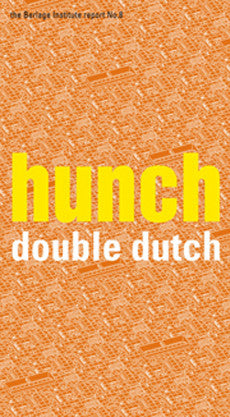Your cart is currently empty!
Architecture
HUNCH 8
+++Double Dutch+++
+++Penelope Dean [ed.]+++
978-90-805362-7-2
Mick Morssink, Penelope Dean
188
30 x 16.5
Paperback
English
HUNCH 8 explores the implications of doubling the Dutch population through studio work directed by Raoul Bunschoten, Bart Lootsma, Winy Maas and Elia Zenghelis.
The projects are organised around six themes: Suburb examines neighbourhood life and the house as product; Urbanism catalogues various approaches to the city; Scenario presents two alternative planning strategies for regional development; Lifestyle reveals the ways in which different models of consumerism impact design; Between documents the multiple uses of interstitial landscapes and Elsewhere examines the import/export value of arguments and approaches globally.
Commissioned texts for this issue include essays by economic geographer Bert van der Knaap; critic and theorist Andreas Ruby; architectural historian Wouter Vanstiphout and design theorist Robert Somol.
SOLD OUT
Double Dutch
€7.50
HUNCH 8
Double Dutch
€7.50
Architecture / Bookazines / Series / Theory / Urbanism
978-90-805362-7-2
Mick Morssink, Penelope Dean
188
30 x 16.5
Paperback
English
HUNCH 8 explores the implications of doubling the Dutch population through studio work directed by Raoul Bunschoten, Bart Lootsma, Winy Maas and Elia Zenghelis.
The projects are organised around six themes: Suburb examines neighbourhood life and the house as product; Urbanism catalogues various approaches to the city; Scenario presents two alternative planning strategies for regional development; Lifestyle reveals the ways in which different models of consumerism impact design; Between documents the multiple uses of interstitial landscapes and Elsewhere examines the import/export value of arguments and approaches globally.
Commissioned texts for this issue include essays by economic geographer Bert van der Knaap; critic and theorist Andreas Ruby; architectural historian Wouter Vanstiphout and design theorist Robert Somol.
SOLD OUT



